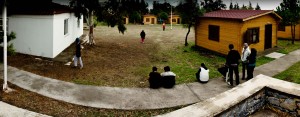CPTnet
4 September 2014
MEDITERRANEAN REFLECTION: Treating migrants like dogs
by Ramyar Hassani
[Note: The following has been adapted for CPTnet.]
 |
| Pipka self-organised reception camp |
On a sunny afternoon while tourists were enjoying a swim in
the sea, the migrants—most from Afghanistan—were sitting in groups waiting for
the police car. Women were sitting together and men chatting with each other. Almost all of the conversations came
back to the registration and asylum procedure, the other European countries who
might take them in, and similar issues. Some of the kids were running around
and some had no energy because they got sick either on the way to Greece or
after their arrival.
Usually the police car comes in the late afternoon to Pikpa—the
open camp organized by local volunteers for migrants in Mytilene, Lesbos—to
transfer some migrants to Moria First Reception Center. Most of the time,
people are waiting in Pikpa for several days to be transferred.
The car arrived and, as usual, kept honking to inform the
migrants in their rooms of its presence. The driver got out of the car. He is
the police officer who calls the names from a list of those migrants who are supposed
to be transferred. Usually this
officer is tired and grumpy. He always wears a big waist bag in which he keeps
personal stuff like cigarettes.
In Pikpa, there is a Greek guy who takes care of some dogs. The dogs are around all the time and have
become a part of the free camp, living there in peace with the volunteers and
people in transit.
As the officer was rushing around to get his work done and
reaching inside his waist bag, one of the dogs appeared. For a moment, the officer’s facial
expression changed. He smiled and
stooped down to stroke the dog with his bare hands. It took him a few moments,
and then he came back to his work and his facial expression restored to its
default. He took out a pair of
gloves from the bag and put them on as he was getting ready to call the names
and in case he had to touch migrants during the procedure.
I think it is okay for anyone to like or dislike pets, to handle
them or not and I even believe that all the animals should be treated
respectfully as the officer treated this dog. But the question is, are the
migrants dirty? Are they unclean? Did they have some contagious disease like leprosy? For some reason, that officer thought
Middle Eastern and African migrants were less clean. But he could have treated those migrants at least as well as
he treated the dog and left off the gloves.



